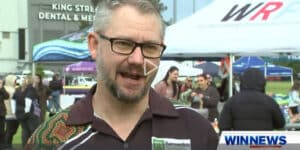For most people in western New South Wales, the Three Wise Women mobile cafe is a place to grab a coffee, but for some women it’s a second chance.
The social enterprise, run by Barnardos Australia, aims to keep mothers who have been in contact with the criminal justice system at home with their families.
The organisation’s Beyond Barbed Wires program provides mothers coming out of jail with training, education and employment opportunities, including work in the coffee van.
“Getting out of jail is really hard. And putting yourself out there, looking for employment can be even harder,” Program Manager Shiree Talbot said.
“There can be problems with not having worked before, not being sure of yourself and not having the self confidence to put yourself out there in community and get employment.”
The coffee van, based in Wellington in central western New South Wales, services community events throughout the region.
Ms Talbot said building the women’s confidence was a key part of the program.
“We go out into the coffee cart with our mums, and support them to build confidence around things like money handling, confidence around customer service, and all of those skills.
“I think if you have a mentor, or someone that you know, in the community that is actually there with you, investing time… it is just such a great gain for our women.”
The flexibility of the hospitality industry allows the women to work around their home lives.
“They have children, ranging from babies all the way up, so [they have] that flexibility to be able to work in an industry where they can be in control of the hours that they’re working,” said Ms Talbot.
Benefits of social enterprises
It’s not just the hospitality industry that is benefiting from social enterprises like the Three Wise Women Mobile Cafe.
Prisoners Aid NSW runs a program that provides men coming out of jail with employment in waste management.
Prisoners Aid manager Craig Baird said the “Mates on the Move” social enterprise was more than just a job for those involved.
“[It] gives them a bit of a work history, should they want to move on to bigger and better things… but also provides them with a fair bit of motivation and feeling part of the community.
“[They’re] contributing to the community in earning wages and paying taxes and having the choices that you get when you have employment.”
Mr Baird said many people leaving the criminal justice system felt isolated and community engagement was key to reconnecting with their local communities.
“If they’re feeling part of the community, and have the positive feelings being engaged with the community brings… they’re less likely to fall back into the cycle of crime.”
Participants leading the way
Mr Baird welcomed further social enterprise initiatives like the Three Wise Women coffee van.
“Everybody’s an individual, and they’re looking for different types of work and different types of education opportunities.
“It’s just a matter of having as many different kinds of opportunities to meet people’s needs.”
Ms Talbot said listening to what those involved wanted was the most important part of the program.
“If we are serious about supporting vulnerable groups of people, and they can be no more vulnerable than women coming out of custody… we have to be led by what the women are telling us.”
She said the training and confidence the cafe provided was invaluable, regardless of which industry the women ultimately moved into.
“They may not want to go on to be baristas — that is no problem at all.
“I’m excited for the women. I love to see them grow and for these women to reach their full potential.”
This article first appeared on the ABC news








